| Srl | Item |
| 1 |
ID:
128232
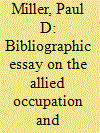

|
|
|
|
|
| Publication |
2013.
|
| Summary/Abstract |
There is no definitive, single-volume history of the Allied occupation and reconstruction of West Germany from 1945 to 1955. This is a significant and surprising lacuna in the literature on US and European history, international relations, and the rapidly growing field in reconstruction and stabilization operations. Scholars, historians, and policymakers need a comprehensive treatment of the German occupation. There is now an opportunity to fill that need. This bibliographic essay reviews the wealth of source material that has become available in recent decades. We can now synthesize primary sources and specialized scholarship to tell the story, for the first time, of how the Allies occupied and rebuilt the western part of Germany.
|
|
|
|
|
|
|
|
|
|
|
|
|
|
|
|
| 2 |
ID:
128228
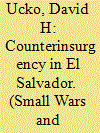

|
|
|
|
|
| Publication |
2013.
|
| Summary/Abstract |
Following two frustrating counterinsurgency campaigns in Iraq and Afghanistan, there is a drive to find new and more viable ways of addressing irregular security challenges. In this effort, the 1980s' campaign in El Salvador has gained prominence, as it resulted in the defeat of the guerrilla adversary yet involved only a modest deployment of US personnel and resources. The use of history to search for models and precedents can be fruitful, but past conflicts must be understood on their own terms and not made to fit the preconceived ideas of the day. A deeper appreciation of what happened in El Salvador reveals not only the unique circumstances that shaped the campaign but also the limited results of the counterinsurgency program to which the war's outcome is now being ascribed. This article adopts a broader lens, focusing on the real yet undervalued factors that produced peace in El Salvador and whether the final outcome was truly quite as successful as is now commonly assumed.
|
|
|
|
|
|
|
|
|
|
|
|
|
|
|
|
| 3 |
ID:
128229
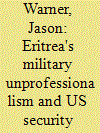

|
|
|
|
|
| Publication |
2013.
|
| Summary/Abstract |
The United States military's Combined Joint Task Force - Horn of Africa (CJTF-HOA) is in need of capable and dependable regional military allies as it seeks to bring stability to the Horn of Africa. Eritrea - once a proclaimed US friend and home to one of Africa's largest military establishments - superficially seems to fit the bill. Drawing from literature on the 'unprofessional nature' of African militaries as well as the scant amount of open source material available on the notoriously secretive nation, this article argues that despite its experienced and well-funded military, President Isaias Afewerki's overbearing control of it has made Eritrea's military highly 'unprofessional' in various ways. As a result, a military that could be a useful US ally in a historically tenuous region will likely remain more of a problem than a boon for the United States into the foreseeable future.
|
|
|
|
|
|
|
|
|
|
|
|
|
|
|
|
| 4 |
ID:
128227
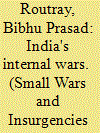

|
|
|
|
|
| Publication |
2013.
|
| Summary/Abstract |
The continued incapacity of the central police forces remains an important reason behind persistent failures of India to deal with the challenge posed by violent extremists. Despite past successes, police-led counterinsurgency responses in the country's internal wars remain riddled with problems. Years of experience in being deployed in conflict-affected areas and considerable numerical strength notwithstanding, the central police forces have failed to emerge as able security providers. Decades of neglect, a slow modernisation process, a vacuum in leadership, and recurrent command and control problems continue to hamper building the country's counterterrorism architecture around these men in uniform.
|
|
|
|
|
|
|
|
|
|
|
|
|
|
|
|
| 5 |
ID:
128226
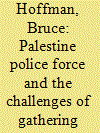

|
|
|
|
|
| Publication |
2013.
|
| Summary/Abstract |
This article assesses the performance of the Palestine Police Force (PPF) in countering the Jewish underground organizations that challenged British rule over Palestine after World War II. It argues that four reasons account for the PPF's inability to contain the terrorist threat: the chronic manpower shortages that ultimately compromised its effectiveness and required the military's intervention; the progressive militarization of the PPF that undermined its ability to discharge traditional police functions; its desperate deployment of elite, special counterterrorist units; and its problematical collection and analysis of intelligence. The article concludes that these weaknesses inevitably led to a situation where the maintenance of law and order was impossible and British rule was rendered untenable.
|
|
|
|
|
|
|
|
|
|
|
|
|
|
|
|
| 6 |
ID:
128231
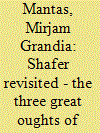

|
|
|
|
|
| Publication |
2013.
|
| Summary/Abstract |
The comprehensive approach, also known as the integrated approach, is foundational to the strategies of the Western countries operating in south Afghanistan. It builds on the same premise as the hearts and minds (HAM) theory: by providing security and basic needs to the population, support is taken away from insurgents. The assumption that a (fragile) state will be able (with support of foreign troops and organisations) to provide basic services, security, and economic prosperity, which was questioned and critiqued by Michael Schafer over two decades ago, is still part of the contemporary concept and seems to remain uncontested. The objective of this article is to test Shafer's claims about the perseverance of what he coined 'the deadly paradigms of counterinsurgency' against the British and Dutch experiences in south Afghanistan starting in 2005.
|
|
|
|
|
|
|
|
|
|
|
|
|
|
|
|
| 7 |
ID:
128230


|
|
|
|
|
| Publication |
2013.
|
| Summary/Abstract |
Efforts at winning hearts and minds (WHAM) impact on and are affected by perceptions of legitimacy. In the Namibian war for independence (1966-1989) efforts of the South African counterinsurgent forces at winning hearts and minds focused mainly on persuading the population to cooperate in exchange for material benefits and services. The article demonstrates that this successfully contributed to a dimension of legitimacy that is conceptualized as pragmatic legitimacy. However, other dimensions of legitimacy are identified in which the South Africans were lacking, that is in moral, legal, and identity-based legitimacy. Furthermore, in areas where control was contested and where the population could not be shielded from insurgent intimidation, it is argued that the effects of coercion outweighed legitimacy altogether.
|
|
|
|
|
|
|
|
|
|
|
|
|
|
|
|